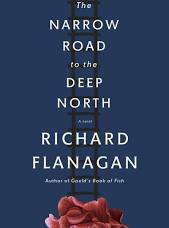The Narrow Road
A brilliant big novel, The Narrow Road to the Deep North won the Booker Prize in 2015 among many other well-deserved awards. It is an outstanding work, a book that will grab you, engage you and keep you thinking.

Richard Flanagan is the author. An Australian born in Tasmania, Flanagan has written non-fiction, novels, short stories and screen plays. He is prolific and if the critics and editors are to be believed, just about everything he puts his mind to, he does well. He is rightly considered one of the most important writers in the world today.
The Narrow Road is a story about love, betrayal, loss, fame, leadership, and above all else, the horrors that Australian POWs faced in World War II as slaves for the Japanese in the construction of the Burmese railway. Flanagan’s father was a POW who lived through it. It was his father’s stories, Flanagan has recounted, that inspired the novel. In real life and in every sense of the word, it was a truly awful history.
In Flanagan’s account, the bigger historical narrative is captured through the actions, reactions, and struggles of multiple characters. Reading it, I thought of Tolstoy’s description of the Battle of Borodino in War and Peace. That chapter famously retells the conflict through the “fog of war.” It is scary, confusing, and messy, giving the reader a powerful sense of just how incomprehensible “history” can be when experienced without a clear narrative. It is overwhelming and, in many ways, unknowable. Only later can it be comprehended, if at all. Flanagan’s characters, trapped in the jungle, live, work and die in just such an unknowable situation. When we are in history, we have little but our convictions to assure us of outcomes.
Flanagan does details with great care; they are haunting and revealing. Especially compelling is Flanagan’s commitment to his characters. He treats each with consideration and care, even the war criminals. I found myself thinking about them as “people” – and wondering, after I finished the book, about particular plot choices and actions. My sense is that Flanagan is most interested in a certain kind of authenticity, a fidelity to a character, a moment, and place. Plotting is important to him, too, but it is not an aggressively plotted work.
Flanagan’s narrative moves effectively across time, space and scope. The success and somewhat “ruined” life of our main character is the thread, the anchor, and reference point. However, the book is really about much, much more than the life of Dorrigo Evans and the tremendous tensions between his public life as a hero and his private pains.
Big picture questions and themes are very effectively explored, weaving together a novel that is memorable and expansive. It has all the heft and weight of literature with a capital “L.” All things considered, it is probably best characterized as a novel whose key theme is history, not people. In that it differs from Dr. Zhivago, for example, a love story set against a sweeping historical drama. Here, and probably much more truthfully, is history rearranging the lives of all that it touches. But the novel is not didactic. The Narrow Road is enough of a page turner that it could be comfortably found in a bookstore under fiction, or perhaps historical fiction. I had trouble putting it down.
I heartily recommend The Narrow Road to the Deep North.
David Potash